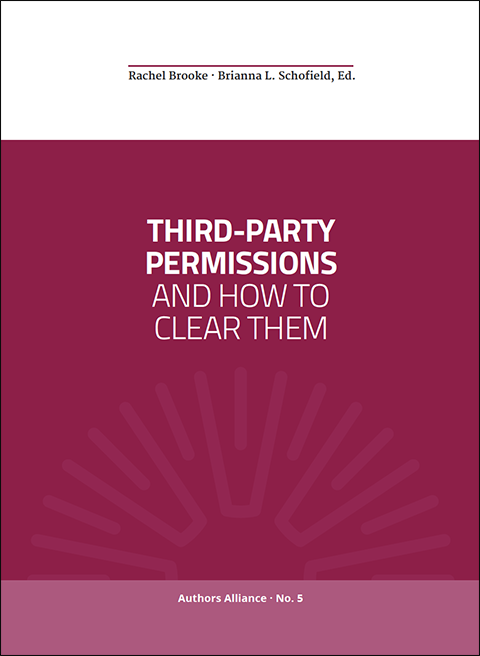Earlier this month, Authors Alliance released a brand new guide—the Authors Alliance guide to Third-Party Permissions and How to Clear Them. In today’s post, we will share some of our favorite tips and tricks from our guide on how authors might approach the permissions process and troubleshoot when they encounter difficulties. If you’d like to learn more, check out our new guide, available under a CC-BY license for you to download and share.
- Start early, but not too early. Because getting permission from rightsholders to use third-party materials in your work can take some time, it is prudent to start early, as the process can take anywhere from days to months. But clearing permissions too early in your writing process can pose its own risks: in some cases, third-party materials end up being edited out of a book during the publisher’s editing process, and if authors have already cleared and paid for these permissions, they have assumed financial burdens that turned out to be unnecessary. For this reason, it is prudent to coordinate with publishers to ensure authors understand their permissions timeline.
- You have allies. Authors tasked with clearing permissions may find the process daunting, as it is intimately related to the legal aspects of publishing, but often the responsibility of the author, who may understandably lack the legal sophistication of publishers. But it is important to keep in mind that publishers share an author’s goal of seeing their work published and successful. While a publisher may not be able to undertake the permissions process on an author’s behalf, they may be able to provide suggestions, form permission letters and logs, and other helpful information if you find yourself stuck. Similarly, academic scholarly communications offices and authors groups like Authors Alliance exist to support scholars and authors, and can sometimes provide general guidance or field questions.
- Don’t be afraid to negotiate. Like a publication contract, a permissions agreement is a legally binding contract that can be enforced in court if it is breached. This means that the terms of the permission agreement are quite important, and it is prudent for authors to take care to understand these terms in order to avoid exposing themselves to liability. It also means that like publication contracts, permissions agreements can be negotiated. Authors should feel empowered to negotiate with rightsholders on fees and other terms, and in fact, authors who come to the table prepared to explain their position may be more likely to convince a rightsholder to compromise.
- Remember fair use. As we discuss in our guide, the doctrine of fair use permits authors to use third-party materials in their own work without permission in some circumstances. For authors who think they may be able to rely on fair use, our permissions guide provides an overview of how an author might think through these issues. Authors who want to learn more about fair use can also check out our guide to Fair Use for Nonfiction Authors for a more in depth discussion of the doctrine.
- Consider creative workarounds. When an author is not able to obtain the permission they need to make use of a particular third-party work, they may have other options that can still enable them to reach their goals for their works. Publicly licensed works, works that are in the public domain, and original commissioned works can serve as adequate substitutes in some cases.
Discover more from Authors Alliance
Subscribe to get the latest posts sent to your email.

